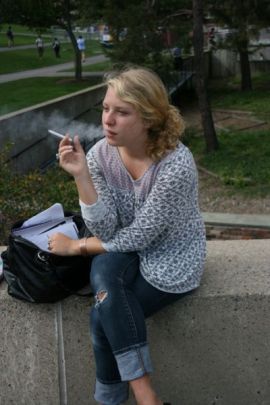A haze hovers over Textor Hall on the Ithaca College campus, dusting the sky with cigarette ash and smoke. On any given weekday, especially between classes and during lunch, small clusters of smokers light up in front of the entryway to Friends Hall. Not only is the area outside of Friends almost always occupied with smokers, but across campus other smoking stations are busy as well.

The social aspect of smoking holds a strong draw for college teens, especially those who might not have had the opportunity to smoke at home.
Sophomore Melanie Connor started smoking at age 15. Connor said she began smoking more when she started college.
“It was easier to smoke at school because my parents don’t approve of smoking,” she said. “So I hide it when I’m home.”
She said she can understand why a lot of students, especially freshmen, might start smoking at college.
“On campus it’s easier to smoke,” she said. “If your parents don’t approve at home, they can’t really stop you here.”
David Newman, director of the Hammond Health Center, said he understands the enduring popularity of smoking cigarettes.
“Over the generations, smoking has maintained the image of coolness,” he said. “That seems to still be a factor for a portion of society.”
Nancy Reynolds, director of health promotion at the Counseling Center, said the college conducts a yearly online survey of undergraduate students called the National College Health Assessment. Last spring, they asked 1,253 students at the college how they felt about alcohol, drugs and tobacco.
Reynolds said the data found in the NCHA survey is as close as the college can get to an accurate reflection of health behaviors and attitudes of students.
The 2009 NCHA data showed that 16 percent of students said they smoked at least once in the past month, 62 percent of students said they had never smoked in their lifetime and less than 3 percent of students said they smoked on a daily basis. Reynolds said though students thought the number of daily smokers would be higher, the college’s smoking population fits the norm compared to other colleges and universities across the nation.
Bonnie Solt Prunty, director of Residential Life and Judicial Affairs, said not all smokers register in HomerConnect — the college’s online registration system — because they do not want their parents to know, they intend to quit or they only smoke infrequently. Only 66 people identified themselves as smokers this year, she said.
Even though smoking may be seen as a bad habit, sophomore Lauren Brown said the college has a welcoming atmosphere and smokers shouldn’t feel out of place.
“Ithaca is really open for people to be who they are and do what they want,” she said.
Senior Bayan Mogharabi, who started smoking cigarettes his freshman year in college, said that this openness can lead to more students smoking.
“Here, if smoking is something you’ve ever considered, you’ll probably end up trying, especially if you’re drinking as well,” Mogharabi said. “When you drink, it’s easier to smoke a cigarette.”
Junior Samuel Adams said another reason some students turn to smoking is because of stress associated with school. For him, smoking is often an easy coping method.
“A lot of people start smoking to relax,” he said. “[College] can be stressful. Smoking’s an easy way to pass the time. When I drink, it’s nice to have a cigarette. It’s short-term euphoria.”
While it is easy to smoke on the college campus, it soon may become difficult to smoke downtown. A proposed ordinance from the Ithaca Legislative Committee would soon, if passed, ban smoking within 25 feet of public schools, playgrounds, outdoor dining areas and within the “inner-T” section on The Commons.
Subcommittee council member Eric Rosario said the purpose of the ban is to reduce secondhand smoke exposure.
“We’re not [just proposing] the ban because people might be annoyed by secondhand smoke,” he said. “It’s about the dangers to public health.”
Rosario said a public hearing is scheduled for late October to get feedback from the community. If passed, the ordinance would be in place at the start of next year.
Svante Myrick, another member of the subcommittee, believes the ordinance is critical in order to better public spaces downtown.
“The No. 1 benefit, which makes it all worth it, is that nonsmokers won’t be subjected to secondhand smoke,” he said.
Myrick said the city doesn’t want to discourage smokers from using public areas or The Commons, but just simply make downtown a healthier place overall.
Secondhand smoke is also a concern at the college for faculty and staff who have to walk through smoking stations to go in and out of buildings. At an all-college staff meeting in
August, a staff member proposed that smoking stations should be relocated on campus. Karen Armstrong, community representative to the staff council, said reminders were sent out last year to encourage staff and faculty members to use the designated smoking points outside of class buildings, but not everyone does.
“I’d be in favor of smoke-free walkways,” she said.
But junior Tatiana Herold said that for her, having designated smoking spots wouldn’t make a difference. She said coming to college never affected her decision to smoke.
“It seems ridiculous to think that people would want to start smoking simply because they see others around campus doing it and feel more comfortable or encouraged now that they are in a college environment,” Herold said.
Brown said either way students look at it, smoking is a conscious choice.
“We’re at an age where if someone is going to smoke, they’re going to smoke,” she said.




